
 Flash News
Flash News
Drenova prison police officer arrested for bringing drugs and illegal items into cell
Lavrov: NATO is risking self-destruction with new military budget
Kurti and Vučić "face off" tomorrow in Skopje
Construction worker dies after falling from scaffolding in Berat
The prosecution sends two Korça Municipality officials to trial

Independent journalism and freedom of expression in Albania is under constant threat, while the media are often captured by narrow political and economic interests.
This conclusion is highlighted by a report recently published by two independent centers that deal with the study of the media, which have summarized with concern the increase in lawsuits and attacks against journalists.
The report published by the Center for Science and Innovation for Development (SCiDEV) and the Observatory of the Balkans and Caucasus Transeurope (OBCT) highlights the disturbing fact of increasing lawsuits against journalists.
Thus, according to the report, during the past year, until July 2024, 43 lawsuits against journalists or media workers were reported, where 38 of them were registered in the Court of Tirana.
At the same time, during this period, there were 28 cases in the Appeal and two more in the Supreme Court.
This atmosphere has negatively affected the quality of investigative journalism, as many media outlets are under pressure to cover or not cover certain stories.
“A large number of lawsuits against journalists have been used as a tool to silence them. "Courts are often influenced by politics and business, making legal protection of journalists extremely difficult," the report said.
Albania does not have an electronic registry for cases against journalists, although the current system of the Court of Tirana allows such a categorization, as explained by the High Judicial Council.
In their report, SCiDEV and OBCT consider self-censorship as one of the most disturbing issues of media freedom in the country.
"Journalists face forced self-censorship, as they are often afraid of the consequences that reporting critical of the government or big business could have," the report states.
According to the report, 94% of the main media in Albania are controlled by a small number of owners with strong political and economic connections.
This concentration of ownership has negatively affected editorial independence, creating an environment where news coverage is influenced by the commercial or political interests of the owners.
The report states that political pressure on the media has increased significantly in recent years. Journalists and newsrooms often face verbal attacks, threats and outright harassment by officials.
The report cites that more than 70% of journalists surveyed admit to self-censoring to avoid jeopardizing their professional positions or to protect themselves from legal and political repercussions.
A specific case included in the report is that of investigative journalist Elvis Hila, who has faced physical attacks and direct threats from local politicians after publishing an article that revealed corrupt schemes in local government units.
Sulmet fizike dhe verbale ndaj gazetarëve janë gjithashtu në rritje.
Në vitin 2023, Rrjeti i Gazetarëve të Sigurt dokumentoi 24 raste të sulmeve kundër gazetarëve dhe profesionistëve të medias, 9 prej të cilave ishin sulme të drejtpërdrejta ndaj disa gazetarëve apo grupeve të profesionistëve të mediave. Gjatë vitit 2024, në periudhën janar-korrik janë regjistruar 19 raste.
Raporti nënvizon se ka një mospërputhje të dukshme në numrin e raportuar nga institucionet me atë të policisë që raporton 5 raste sulmesh në vitin 2023 dhe prokuroria që raporton 7 raste.
“Kjo mospërputhje nënvizon nevojën për regjistrim dhe publikim sistematik dhe të saktë të të dhënave për sulmet ndaj gazetarëve dhe punonjësve të medias si nga policia ashtu edhe prokuroria”, thuhet në raport.
Një tjetër shqetësim madhor janë pengesat për gazetarët që duan të ushtrojnë gazetarinë investigative. Raporti përmend që qasja në informacion mbetet e vështirë, dhe gazetarët përballen me një burokraci të rëndë kur përpiqen të marrin informacione publike nga institucionet shtetërore.
Për më tepër, gazetarët që raportojnë për korrupsionin dhe abuzimet e pushtetit shpesh përballen me ndëshkime të ndryshme, duke përfshirë paditë e shumta ligjore.
Raporti zbulon se vetëm 15% e kërkesave për informacion të bëra nga gazetarët janë pranuar brenda afatit ligjor. Për më tepër, shumë nga informacionet e dhëna janë të pjesshme ose të manipuluara, duke e bërë të vështirë për gazetarët të kryejnë një analizë të plotë dhe të saktë të çështjeve të ndjeshme publike.
Në një zhvillim të ri, media online dhe rrjetet sociale po luajnë një rol gjithnjë e më të rëndësishëm në informimin e publikut.
Megjithatë, raporti shpreh shqetësime për dezinformimin dhe mungesën e transparencës së shumë mediave online. Mungesa e rregullimit efektiv të këtyre mediave ka sjellë një rritje të lajmeve të rreme dhe manipulimit të opinionit publik.
Më shumë se 50% e faqeve online nuk kanë të dhëna të qarta për pronarët dhe veprojnë në mënyrë anonime, duke kontribuar në përhapjen e lajmeve të rreme dhe manipulimit të opinionit publik.
“Rritja e medias online ka sjellë një përhapje të dezinformimit, ndërsa mungesa e rregullimit ka bërë që shumë platforma të operojnë pa transparencë dhe standarde etike”, përcjell raporti.
Një shqetësim në rritje që është evidentuar nga raporit janë dhe sulmet kibernetike ndaj medias.
“Në vitin 2024, sulmet kibernetike nxorën në pah sfida të mëdha për mediat e pavarura (rasti i Citizens), duke theksuar domosdoshmërinë që agjencitë e zbatimit të ligjit të pajisen me burime të mjaftueshme për të adresuar numrin në rritje të këtyre incidenteve që kanë si objektiv gazetarët si dhe qytetarët në përgjithësi”, thuhet në raport.
Raporti nënvizon se figurat politike urdhërojnë kryesisht sulme kundër mediave kritike, investigative ose gazetarëve të pavarur, duke përmendur rastin e Ola Xamës.
The actual number of incidents likely exceeds the number of documented cases, highlighting the importance of empowering journalists regarding their rights and protection.
The report notes that women in their sixties in Albania continue to report cases of sexual harassment, online violence and smear campaigns as the most common forms of gender-based pressures they face.
"These pressures are often not reported," the report says, and adds that many female journalists feel that their complaints will not be taken seriously or that journalists will face retaliation if they report.
"Furthermore, there are growing concerns about gender-based disinformation and online violence against women journalists," the report continues.
The SciDev report suggests that to improve the media situation in Albania, measures should be taken to guarantee editorial independence and to protect journalists from political and economic pressure.
An increase in transparency in media ownership and easier access to public information is also recommended./ Citizens.al
Latest news



Second hearing on the protected areas law, Zhupa: Unconstitutional and dangerous
2025-06-30 22:18:46



Israel-Iran conflict, Bushati: Albanians should be concerned
2025-06-30 21:32:42

Fuga: Journalism in Albania today in severe crisis
2025-06-30 21:07:11
"There is no room for panic"/ Moore: Serbia does not dare to attack Kosovo!
2025-06-30 20:49:53

Temperatures above 40 degrees, France closes nuclear plants and schools
2025-06-30 20:28:42
Lavrov: NATO is risking self-destruction with new military budget
2025-06-30 20:13:54
Turkey against the "Bektashi state" in Albania: Give up this idea!
2025-06-30 20:03:24

Accused of sexual abuse, producer Diddy awaits court decision
2025-06-30 19:40:44



Kurti and Vučić "face off" tomorrow in Skopje
2025-06-30 18:44:12
Tourism: new season, old problems
2025-06-30 18:27:23


Construction worker dies after falling from scaffolding in Berat
2025-06-30 17:51:44




Almost free housing: East Germany against depopulation
2025-06-30 16:43:06

Hamas says nearly 60 people killed in Gaza as Trump calls for ceasefire
2025-06-30 16:14:15
Drownings on beaches/ Expert Softa: Negligence and incompetence by institutions!
2025-06-30 16:00:03


European ports are overloaded due to Trump tariffs
2025-06-30 15:30:44
The prosecution sends two Korça Municipality officials to trial
2025-06-30 15:19:54

Lezha/ Police impose 3165 administrative measures, handcuff 19 drivers
2025-06-30 14:55:04
Young people leave Albania in search of a more sustainable future
2025-06-30 14:47:52
Record-breaking summer, health threats and preventive measures
2025-06-30 14:36:19


Constitution of the Parliament, Osmani invites political leaders to a meeting
2025-06-30 14:07:54

Heat wave 'invades' Europe, Spain records temperatures up to 46 degrees Celsius
2025-06-30 13:42:02
Accident in Vlora, car hits 2 tourists
2025-06-30 13:32:16

Kurti confirms participation in today's official dinner in Skopje
2025-06-30 13:03:27

Fight between 4 minors in Kosovo, one of them injured with a knife
2025-06-30 12:38:45

Report: Teenage girls the loneliest in the world
2025-06-30 12:20:40
Commissioner Kos and Balkan leaders meet in Skopje on Growth Plan
2025-06-30 12:07:59
Wanted by Italy, member of a criminal organization captured in Fier
2025-06-30 11:55:53
Hundreds of families displaced by wave of Israeli airstrikes in Gaza
2025-06-30 11:45:17
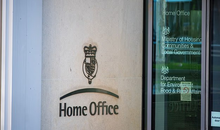
Zenel Beshi: The criminal who even 50 convictions won't move from Britain
2025-06-30 11:23:19
A new variant of Covid will circulate during the summer, here are the symptoms
2025-06-30 11:14:58

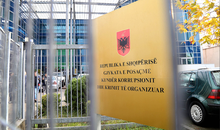
"Partizani" case, trial postponed to July 21 at the Special Court
2025-06-30 10:41:05
Uncontrolled desire to steal, what is kleptomania, why is it caused
2025-06-30 10:30:08
Requested change of security measure, hearing for Malltez postponed to July 7
2025-06-30 10:24:32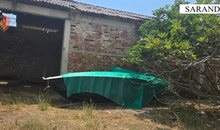


Output per working hour in Albania 35% lower than the regional average
2025-06-30 09:54:35
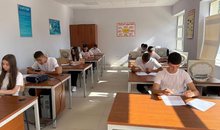
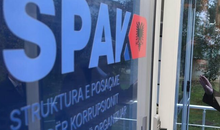
The trial for the "Partizani" file begins today
2025-06-30 09:27:57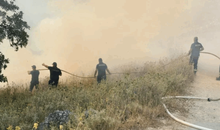
22 fires in the last 24 hours in the country, 2 still active
2025-06-30 09:21:28
How is the media controlled? The 'Rama' case and government propaganda
2025-06-30 09:13:36
German top diplomat: Putin wants Ukraine to capitulate
2025-06-30 09:00:07
Foreign exchange, how much foreign currencies are sold and bought today
2025-06-30 08:44:38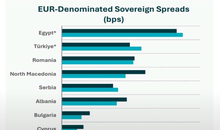
Chart/ Sovereign risk for Albania from international markets drops significantly
2025-06-30 08:26:38
Horoscope, what do the stars have in store for you?
2025-06-30 08:11:44
Clear weather and passing clouds, here is the forecast for this Monday
2025-06-30 07:59:32
Morning Post/ In 2 lines: What mattered yesterday in Albania
2025-06-30 07:47:37
Milan make official two departures in attack
2025-06-29 21:57:23
6 record tone
2025-06-29 21:30:46
4-year-old girl falls from balcony in Lezha, urgently taken to Trauma
2025-06-29 21:09:58


Assets worth 12 million euros seized from cocaine trafficking organization
2025-06-29 19:39:43
Fire in Durrës, Blushi: The state exists only on paper
2025-06-29 19:17:48

Fire endangers homes in Vlora, helicopter intervention begins
2025-06-29 18:27:51
France implements smoking ban on beaches and parks
2025-06-29 18:02:08
England U-21 beat Germany to become European champions
2025-06-29 17:42:49
Trump criticizes Israeli prosecutors over Netanyahu's corruption trial
2025-06-29 17:08:10
Street market in Durrës engulfed in flames
2025-06-29 16:52:57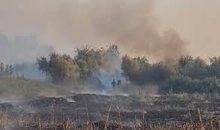

UN nuclear chief: Iran could resume uranium enrichment within months
2025-06-29 16:03:24
Albanian man dies after falling from cliff while climbing mountain in Italy
2025-06-29 15:52:01

Another accident with a single-track vehicle in Tirana, a car hits a 17-year-old
2025-06-29 15:07:15
While bathing in the sea, a vacationer in Durrës dies
2025-06-29 14:54:01
Sentenced to life imprisonment, cell phone found in Laert Haxhiu's cell
2025-06-29 14:26:40
77 people detained in protest, Vučić warns of new arrests
2025-06-29 14:07:46

